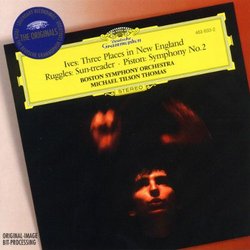Quintessential Ives, Ruggles, Piston, and MTT
DAVID A. FLETCHER | Richmond, Va United States | 08/09/2004
(5 out of 5 stars)
"I must confess a bit of biographical prejudice in reviewing this disc. It was the original DG LP incarnation of the Ives included here--"Three Places..."--and its Ruggles discmate "Sun Treader" that opened my eyes to both composers back in high school. That worn library copy, with its glorious DG sonics captured in Boston Symphony Hall in the early '70's, was returned overdue more than a few times. I'd investigated it hot on the heels of seeing MTT conduct the Ives on one of the New York Philharmonic's "Young People's Concerts" televised by CBS, a series which Thomas took over from the departing Leonard Bernstein. Hearing MTT and the BSO on the LP confirmed what I'd learned from the television presentation, and the Ruggles companion piece gave me yet another foothold in 20th century American music.
While MTT doesn't really enjoy the comparisons, it would be less than truthful to say that not a little of Lenny's knack with American symphonic writing, as well as the barely-controlled histrionics of Gustav Mahler, rubbed off on him during their professional association in the '60's and '70's. And, even today, you can see it with Thomas's growing cycle of Mahler symphony performances with the San Francisco Symphony Orchestra. Ives' and Mahler's contemporary popularity owe more than a little to Bernstein's advocacy, and it's this tradition that MTT falls into. Likewise, one must admit that he often surpasses his mentor.
While Ives was often quite specific in his musical notation and verbal playing instructions, he also encouraged performers to explore the implied "possibilities" of the piece. To understand Ives is to understand musical Americana. Charles Ives, growing up in Danbury, CT, in the late Victorian era under the tutelage and example of his bandmaster-father George Ives, absorbed several American music traditions: traditional hymnody and choral music, small-town brass bands with their often-times less than perfect pitch and ensemble, and the omnipresent European-based symphony orchestra with its established expressive vocabulary. These traditions, focused and remolded under the spell of New England Transcendentalism as expressed in the writings of Emerson and others, become the key ingredients of the Yankee musical "stew" which is quintessential Ives. Therein lies his genius, something which MTT understands deeply.
The turgid, brooding orchestral color of "The 'St. Gaudens' in Boston Common," the incredible mix of Fourth of July pomp and a schoolboy's daydreaming that make up "Putnam's Camp," and the wistful yet powerful evocation of the newlywed Ives couple's walk along "The Housatonic at Stockbridge," all receive their due here in a performance that I return to again and again with pleasure. The added bonus, of course, is the recorded sound, coming as it does from a vintage period of recordings made by DG at Boston Symphony Hall, the acoustic of which can become an ambient swamp if not as successfully managed as it is here. Contrary to an earlier reviewer's remarks, MTT truly "gets" Ives; one only has to hear that moment in "Housatonic" when the swirling string textures give way to the introduction of the "Contented River" theme, one of the most magical moments in all of American symphonic literature. I've never heard another performance match it.
The Ruggles "Sun Treader," as thorny and imposing an opus as one can find, offers equal rewards in MTT's hands, again with the BSO's performance on its home turf yielding major dividends. Ruggles was strongly championed by Thomas, an effort which resulted in a multi-disc LP set of Ruggles' complete works recorded with the Buffalo Philharmonic by CBS/Sony which has yet to see the light of day on CD, a travesty both for collectors and fans of this important American voice. "Sun Treader," the title of which is drawn from Robert Browning's tribute to Percy Shelley, draws its inspiration not from the latter (Ruggles had absolutely no interest in Shelley), but from Browning's verbal imagery...think of a titan's thunderous striding--tympany strokes--across a landscape of barely-contained orchestral movement. Browning, like Emerson, was also an interest of Charles Ives; perhaps a new recording by MTT and the San Francisco Symphony of "Sun Treader," coupled with the Ives "Robert Browning Overture," might by suggested by the A&R folks at BMG/RCA? Sometimes these things just suggest themselves.
Coming at the close of the present disc, the Piston Symphony #2 represents a somewhat less craggy musical lineage. Maine native Walter Piston achieved an almost Italianate elegance in his marriage of New England economy and French musical training. Within the symphony there is warmth, heart, reason, civility, all energetically presented by MTT in the present performance. A fitting finale, then, to a wonderful reissue by DG of spendid readings of 20th century American masterpieces."


 Track Listings (12) - Disc #1
Track Listings (12) - Disc #1